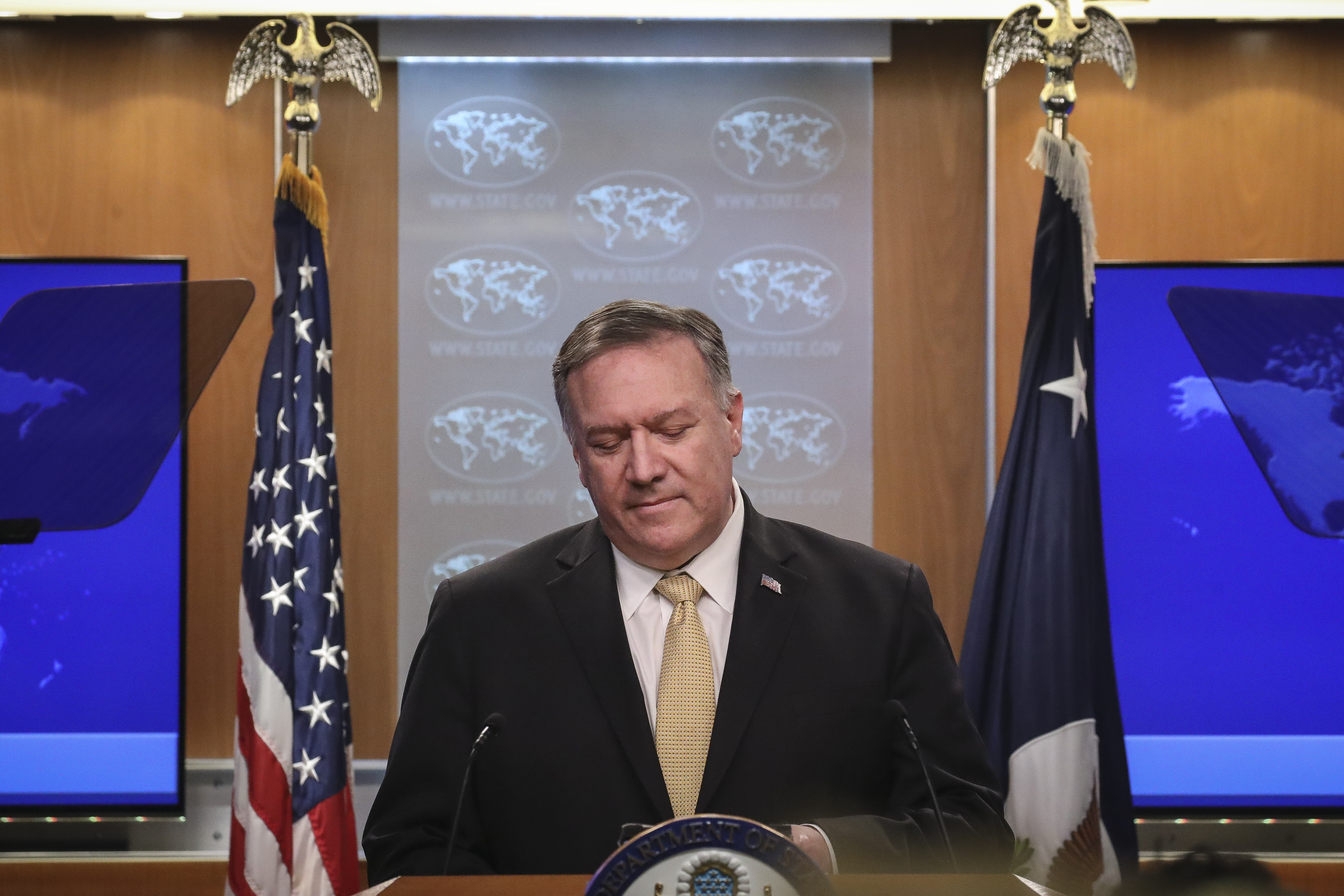In new pro-Israel shift, US no longer calls settlements illegal

WASHINGTON, DC – NOVEMBER 18: U.S. Secretary of State Mike Pompeo pauses while speaking during a press conference at the U.S. Department of State on November 18, 2019 in Washington, DC. Pompeo announced that the Trump administration does not consider Israeli settlements in the West Bank a violation of international law. Pompeo also spoke about protests in Iran, Iraq and Hong Kong. Drew Angerer/Getty Images/AFP
WASHINGTON — The United States no longer believes that Israeli settlements in the Palestinian territories are illegal, Secretary of State Mike Pompeo announced Monday, in the latest pro-Israel shift by Washington.
The statement puts the United States at odds with virtually all countries as well as UN Security Council resolutions and was hailed by Israeli Prime Minister Benjamin Netanyahu, a close ally of President Donald Trump who is days away from potentially losing office.
“After carefully studying all sides of the legal debate,” Pompeo told reporters, the United States has concluded that “the establishment of Israeli civilian settlements in the West Bank is not, per se, inconsistent with international law.”
“Calling the establishment of civilian settlements inconsistent with international law hasn’t worked. It hasn’t advanced the cause of peace,” Pompeo said.
Pompeo said that the United States was not necessarily considering the settlements legal either but instead would defer to the judgment of Israeli courts.
Article continues after this advertisementThe Palestinian Authority — which has refused negotiations through the Trump administration, which it considers biased — denounced the latest decision.
Article continues after this advertisementWashington is “not qualified or authorized to cancel the resolutions of international law, and has no right to grant legality to any Israeli settlement,” Palestinian presidential spokesman Nabil Abu Rudeinah said in a statement.
But Netanyahu said that the US shift “rights a historical wrong” for the 600,000 Israeli settlers who live in the West Bank and East Jerusalem among around 2.9 million Palestinians.
“This policy reflects a historical truth — that the Jewish people are not foreign colonialists in Judea and Samaria. In fact, we are called Jews because we are the people of Judea,” he said in a statement, using the biblical term for the West Bank.
The move will surely be interpreted as a boost for Netanyahu as his centrist rival, Benny Gantz, has only two days to form a government after inconclusive elections.
Pompeo denied a motivation to prop up Netanyahu, saying: “The timing of this was not tied to anything that had to do with domestic politics anywhere in Israel or otherwise.”
Break with past
Until now, US policy was based, at least in theory, on a legal opinion issued by the State Department in 1978 which said that settlements in the Palestinian territories captured a decade earlier by Israel went against international law.
The Fourth Geneva Convention on the laws of war explicitly forbids moving civilians into occupied territories.
While the United States has generally vetoed Security Council measures critical of Israel, previous president Barack Obama, exasperated with Netanyahu, in his final weeks in office allowed the passage of Resolution 2334 that called Israel’s settlements a “flagrant violation” of international law.
Pompeo said that the Trump administration, whose evangelical Christian base is staunchly pro-Israel, was rejecting the Obama administration’s approach.
But he said he was not necessarily giving a green light for settlements.
“This was not meant to send a message… should there be more settlements, should there be fewer settlements. This was intended to be a legal review,” he said.
Settlements growing
But Israel has already been increasingly emboldened. Activist group Peace Now said that Israel has approved 8,337 housing units in the year through October, an increase of 50 percent from a year earlier.
Israel dismantled homes in the Gaza Strip when it withdrew in 2005 and draws a distinction between settlements and construction in east Jerusalem, which has been annexed by the Jewish state.
Netanyahu vowed in his latest election campaign also to annex large parts of the West Bank, a move that would effectively end a two-state solution.
Trump has taken a number of landmark steps including recognizing Jerusalem as Israel’s capital and cutting off aid to the UN agency that provides schooling to Palestinian refugees.
The latest step puts the United States at stark odds with the European Union, whose top court ruled last week that goods from Israeli settlements must be labeled as such.
Democratic candidates seeking to challenge Trump in next year’s election have all to varying degrees disagreed with his embrace of Netanyahu and pledged to support a two-state solution.